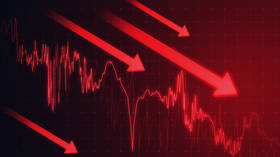Global stock market crash: As it happened

Stock markets went into a meltdown on Monday amid fears that the US could be heading for a recession, pushing investors into panic-selling mode, market data shows.
The US has seen an unexpected rise in the unemployment rate, according to July payrolls report unveiled on Friday. This led to markets betting on the Federal Reserve cutting rates in September by a full 50 basis points, and sparked debate among economists about the overall health of the US economy, with its enormous influence in the global financial market.
US stocks closed sharply down on Friday, with the technology-heavy Nasdaq Composite falling into correction, but Monday kicked off with new drops.
This live stream has ended.
05 August 2024
18:11 GMTThe Dow was down around 1,000 points, or 2.7%, as Monday’s session neared the close. The Nasdaq was trading 3.8% lower, while the S&P 500 was 3.2% off. Earlier in the session, the Dow was off by more than 1,200 points.
Fears of a US recession were the main culprit for the global market meltdown after Friday’s disappointing July jobs report.- 17:07 GMT
Some analysts say the global economy is fine and that investors are overreacting. “The market panic appears disproportionate,” EY chief economist Gregory Daco wrote in a note to clients, as quoted by CNN. “In our opinion, the core issue lies with the Fed being behind the curve, in action and in thought, rather than a significant economic downturn.”
Chief economist at RSM US, Joseph Brusuelas, described the global selloff as a “classic market panic.” It is important to remember that the market is not the economy, he said.
Jim Smigiel, chief investment officer at SEI, echoed the sentiment, writing: “Quite frankly, this selloff is now overdone.”
- 16:27 GMT
Several popular online trading platforms, including Fidelity, E-Trade and Robinhood, were reportedly experiencing technical difficulties on Monday amid the global stock selloff. Brokerage company Charles Schwab said its clients were having trouble logging on and added their teams were working “to resolve the issue as quickly as possible.”
- 15:50 GMT
Ed Yardeni from Yardeni Research told Bloomberg the stock market sell-off is not necessarily indicative of a US recession.
“The sell-off here is to a large extent attributable to the unwind of the so-called carry trade... A lot of speculators went and borrowed in Japan at zero interest rates, raised a lot of money… and used it to speculate in other parts of the world. Now it’s all coming unglued, and there is a lot of margin calls.
“I don’t think that what we’re seeing here is attributable to an imminent recession nor that we’re in recession now, and I think this too shall pass.”
- 15:42 GMT
The Bloomberg Magnificent 7 index, which tracks America’s seven largest tech companies, has regained much of the losses it suffered at market opening and was down about 2.7% around 15:30 GMT, up from the 9% drop it saw earlier in the day. Nvidia and Apple are still its biggest losers, but the former is now down about 6% from 15% at market opening, while the latter is down about 4% after its 11% plunge.
- 15:18 GMT
Most US stocks and key market indicators appeared to have regained some ground from their lows at market opening, but were still sharply down one hour into Monday’s trading session. Wall Street’s ‘fear gauge’, the CBOE VIX Index, which monitors market volatility, has dropped to around 42 from a high over 65.
- 14:45 GMT
J.D. Vance, Donald Trump’s running mate in this year’s presidential election, says Vice President Kamala Harris, Trump’s rival for the White House, doesn’t have what it takes to deal with the unraveling stock market crisis.
“This moment could set off a real economic calamity around the globe. It requires steady leadership – the kind President Trump delivered for four years. Kamala Harris is too afraid to answer media questions and cannot lead us in these troubled times,” he wrote on X (formerly Twitter).
- 14:32 GMT
Shares of large US banks fell in morning trading, with JP Morgan down 2.4%, Morgan Stanley falling 3.6%, and Bank of America trading 3.4% lower. Shares of Wells Fargo are plunging 4.3%, Citigroup is down 5.4%, and Goldman Sachs is 3.5% in the red.
- 14:31 GMT
“Selloffs that manifest themselves through wild swings in the currency markets are sharp and swift, but usually very short-lived. Markets are clearly nervous about the divergent paths central banks are taking,” Jamie Cox from Harris Financial Group said in a note to Bloomberg.
“Couple that with a potential escalation of hostilities in the Middle East and a Presidential election cycle that is rife with craziness, things are ripe for negativity,” he added, suggesting investors “use this downturn to pick up some deals.”
- 14:02 GMT
US tech stocks are all trading in the red on Monday, with Microsoft and Alphabet down by roughly 3%, while Meta dropped by 4%. Apple, Amazon, and Tesla are trading around 5% lower. Nvidia has so far plunged by roughly 8%.













